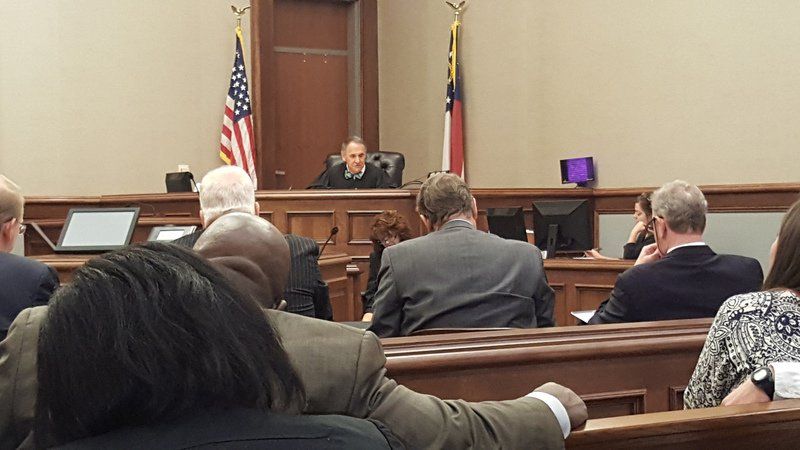Tax commissioner waives millions: county may have lost $3 million in penalties, fees
Published 1:54 pm Wednesday, May 20, 2020

- Rodney Cain, Lowndes County Tax Commissioner
VALDOSTA — Lowndes County Tax Commissioner Rodney Cain has waived almost $3 million in penalties and interest owed to the county but was never given the authority to do so.
In fact, county leaders specifically told Cain to stop, and he continued the practice — waiving large fees for some residents while denying similar requests from others.
There is a legal process for waiving the fees, but Cain did not follow it.
The legal process is fairly simple. Tax commissioners are required to ask county commissioners to pass a resolution authorizing penalty and interest waivers. The process can be found at: § 48-5-242 of the Official Code of Georgia Annotated.
Public records show Cain has waived fees for years, without a county resolution to authorize it.
During a three-year period — from Jan. 1, 2017 to May 13, 2020 — records indicate the tax commissioner waived $936,505.34 in interest and penalty payments due the county. But a review of financial documents indicates the total is closer to $3 million and county government has launched a more comprehensive forensic audit to determine the exact amount, according to Lowndes County Commission Chairman Bill Slaughter.
Cain was expressly denied authorization to grant waivers on at least two occasions. A letter and an email, obtained by The Valdosta Daily Times through open records requests, show Slaughter specifically told Cain he did not have the authority.
After first agreeing to an interview with The Valdosta Daily Times, Cain declined invitations to answer questions, explain his actions or give any additional context, opting instead to make numerous Facebook posts regarding controversies surrounding his one-term tenure as tax commissioner during the past weeks.
Slaughter sent a letter Aug. 5, 2019, informing Cain he did not have the authority to forgo penalties and interest.
Seven months later, Slaughter sent an email response on March 24 to Cain declining his request to waive penalties and interest for property taxes due April 1. Cain agreed saying, “I totally agree; our feelings on this issue are mutual.”
Yet, he continued the practice.
Slaughter told The Valdosta Daily Times he is concerned about Cain continuing to waive fees due the county after specifically being told it was unauthorized.
“If that was a mistake, fine. That was what was behind,” he said. “But my concern primarily is from Aug. 5 when he got the letter from me stating that he did not have the authorization to do that.”
Resolutions required
Tabetha DuPriest said each tax commissioner must “absolutely” obtain a specific resolution with his or her name on it, in order to legally waive penalties and interest.
In addition to being Worth County’s tax commissioner, DuPriest is the president of the Georgia Association of Tax Officials, an advisory and support agency for tax commissioners around the state that provides training for newly elected tax commissioners.
“We always say ‘put that in writing’ because they are in general the governing body (over resolutions),” she said.
DuPriest said she also waives penalties and interest, but makes sure the first thing she does every four years is obtain a new resolution from the Worth County Board of Commissioners.
When asked about tax commissioners forgiving penalties and interest without a resolution, DuPriest said, “If they’ve never had the resolution and they’ve waived them, they’re wrong. They’re doing something that is not correct.”
The most recent county resolution on file allowing the practice in Lowndes was in 1995 for then-tax commissioner Paul Sumner, according to a county statement. Mary Nell Robertson, Sumner’s successor and Cain’s predecessor, told The Times she received a resolution to waive penalties and interest every four years during her tenure stretching from 1999 to 2016. After an open records request, the county said it has no record of those resolutions.
Not every county tax commissioner around the state chooses to waive fees.
Emanuel County Tax Commissioner Sandra Wright, Gordon County Tax Commissioner Scott Clements and Coweta County Tax Commissioner Robi Brook do not waive penalties and interest. They have served 24 years, 11 years and two months in office, respectively, yet none have needed a resolution because none of them waive fees due the county.
Slaughter’s main concern is Cain’s discretion, selecting which residents receive forgiveness and which are assessed additional charges.
“I want the collections of taxes to be applied fairly to all citizens in Lowndes County, and that is not the case when you are waiving penalties and interest,” Slaughter said. “You are basically selecting the individuals you choose to waive those penalties.”
A clear pattern
Cain was elected November 2016 and began his term as the county tax commissioner Jan. 1, 2017.
Starting January 2017, records indicate the Lowndes County Tax Commissioner’s office consistently waived penalties and interest for nearly three and a half years under Cain’s watch.
9/21/18: An employee emails Cain about how his office waived fees was appreciative of Cain “removing the penalties and interest on the bill you discussed,” read the email. In an email response, Cain acknowledged the employee and said “it is also nice to know that customers appreciate such favors.”
2/20/19: An employee emails a resident about a lapse fee from not having valid insurance on their vehicle. The employee suggests a resolution to the resident where ”we can override these fees if you give me permission to cancel the registration until you are ready to drive the vehicle.” Cain, already aware of the situation, responds saying “I like that. It sounds professional!”
3/22/19: Cain emailed two employees about a resident being “a little upset” over sending a $14 check for penalties saying “I explained to him that we decided to take care of the second penalty for him in house.”
4/29/19: Ann Harrell, Early County tax commissioner at the time, sent to the tax commissioners across the state asking if she needed a resolution to sell mobile homes for less than the taxes owed at a tax sale. Cain responded to the email saying “I think it may be a good idea but I didn’t ask for a resolution when I did this. I feel that my commissioners have enough common since (sic) to understand why this is needed from time to time. To cover yourself you may ask for a resolution; better safe than sorry.”
3/24/20: A year later, Slaughter sends an email forbidding Cain from waiving property taxes on April 1 and Cain responds, “I totally agree; our feelings on this issue are mutual.” That same day, the tax commissioner informs a resident that he has “been advised by the Lowndes County Commissioners to not relieve interest and penalties until further notice.”
4/9/20: Cain appeared to fully understand the need for permission in an email to a resident saying “last month I notified the County Commissioners asking them for permission to waive these late fees for even just a short time. I was hoping for just a 60 or possible (sic) a 90-day extension. I sent to them a copy of a resolution already prepared for them to simply sign. They refused to give me an extension. My hands are tied without receiving a resolution from the Board of Commissioners.”
Where would the money go?
After being read an email from Cain dated Sept. 9, 2018, Slaughter did not mince words.
“We’re not in the business of favors. We’re in the business of serving the citizens that we’re elected to serve. Favoritism really has no place from my standpoint in local politics,” he said. “You should be as equally fair to one and all, so that is very disappointing that any elected official chooses to have favoritism with one citizen over another citizen.”
If the $936,505.34 had been collected, where would it have gone? Those collections would have been distributed among the county, school systems and the cities, according to Slaughter.
”It’s a shortage of revenue at the end of the day that comes back into Lowndes County that needs to be collected, should be collected and we will be able to provide the services for the citizens of Lowndes County as well as our school systems,” he said.
With that money not being collected, those bodies are required to readjust budgets and consider methods to offset costs.
“Every dollar does count. Personally, I have a problem with waiving fees and interest simply because it’s not something that’s being done fairly across the board,” he said. “If that was the policy that someone wanted to take, whether it’s the tax commissioner or what have you, then it needs to be done fairly all the way across to all taxpayers. That is not the case from what I understand.”
Island of constitutional officers
There are four different county constitutional officers: tax commissioner, sheriff, superior court clerk and probate judge.
County constitutional officers are publicly elected positions that have their roles outlined in the state Constitution.
“Their roles and responsibilities are set by the Constitution of Georgia and are amended by the legislature,” said Missy Tolbert, executive director of the Constitutional Officers Association of Georgia.
These officers do not operate under the direct supervision of county commissions which can create a “touchy situation” between the two parties, Slaughter said.
“Ultimately, (constitutional officers) answer to the state and answer to voters,” Tolbert said.
The Association County Commissioners of Georgia’s, an advisory body of the state’s county governments, guidebook for county governments describes powers and duties of constitutional officers as being determined by “general law and not on a county-by-county basis.” Their duties and minimum salaries are set by the General Assembly and “are not within the authority of the board of commissioners to control,” according to page 8 of the guidebook.
Although the county sets a budget and provides services such as Human Resources for the tax commissioner’s office, the county cannot tell the tax commissioner how to allocate funds or operate the office.
“We communicate on a very positive relationship but at the end of the day, the final decision about what they particularly do I would have to say is their decision,” Slaughter said.
Who has oversight?
Constitutional officers hold unique positions in Georgia government and authority and accountability over them can be murky.
In Lowndes, constitutional officers maintain their separation from the county commission, communication and relationships between the two parties usually result in those officers complying with the chairman’s advice or directives, Slaughter said.
When that doesn’t happen?
“Very frustrating,” Slaughter said in just two words.
After consulting with the county attorney, he said the county felt paralyzed not being able to make Cain abide by its wishes.
According to page 57 of the ACCG handbook, disputes between a county’s constitutional officer and the commissioners “regarding the administration of county affairs are reviewable by the superior court.”
It goes on to say the court’s “reviewing power is exercised with caution, and the courts will not interfere with actions of the commissioners except in cases of clear and manifest abuse of discretion.”
For an investigation and possible charges to be brought against a constitutional officer, there would need to be a specific criminal penalty stipulated in the law they are accused of violating, Southern District Attorney Brad Shealy said.
Neither subsections “a” or “c” in § 48-5-242 of the O.C.G.A contain criminal penalties if the tax commissioner violates the law by collecting penalties and interest without the written approval by the governing authority of the county.
“You’ve got to have a law that says, ‘you can’t do this and if you do this, this is the penalty – misdemeanor, felony or whatever.’ But if it just says, ‘you can’t do this’ but doesn’t really describe a penalty, then there’s nothing I can do,” he said.
One recourse could be a writ of mandamus, which is a civil document that allows a court to force a government official to properly perform official duties or correct an act of indiscretion, said Jim Elliott, adjunct professor of law at the Walter F. George School of Law at Mercer University.
“As I’m told, this last option has limited success and is expensive for the county as they are paying the legal expenses of both sides of the lawsuit,” he said.
The department of revenue could play a hand, as an agency with the ability to investigate tax commissioner’s offices around the state, Tolbert said.
The Office of the Attorney General of Georgia provided several sections of the O.C.G.A. (§ 48-5-159, § 48-5-162, § 48-5-155 and § 48-5-205) that lay out scenarios for penalties, suspension and removal of a tax commissioner, but none of the codes mention defying a county’s mandate to not waive fees and interest.
From DuPreist’s interpretation, only the governor can remove a sitting tax commissioner from office, but voters can decide whether to reelect them, she said.
The tax commissioner position is a publicly elected office, and with only one opponent from the same party, Cain’s reelection will be decided by the primary in the June 9 election.
This story was updated at 4:02 pm May 20.





